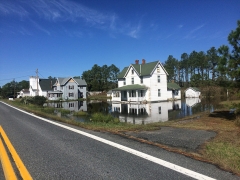After six years of anthropology courses, exams, proposal writing, and research, I’ve finally reached the last big hurdle of my Ph.D. career: writing the dissertation. My research is on understanding how heritage – the practice of using the past to influence change – shapes climate change planning being carried out by the Deal Island Peninsula Project on Maryland’s Lower Eastern Shore. I can tell you all about skipjacks and Methodism, traditions of working the water, and tales about Chesapeake Bay history. And I can explain how these pieces of local and regional heritage have shaped attitudes and understandings about flooding, erosion, and climate change, as well as working relationships between diverse stakeholders who are collaboratively tackling these issues on Deal Island. Rather than get into the nitty-gritty of my research though – I’ll let you read my dissertation for that – I’d like to share some of my own reflections on the daunting task of writing it all up.
I can’t tell you how many times I’ve heard someone say over the last few months, “All you have left to do is write the dissertation!” Sounds easy, right? Just one last box to check, and the challenges of a Ph.D. program are over! As many of you who are or have been in my shoes, you probably know it’s a big box to say the least.
I have always found writing to be a struggle. I partly attribute that to my perfectionist tendencies, which make me slow and methodical, but also because in theory, it seems like writing should a straightforward Point-A-to-B process. You put words to paper, and one by one they fill up a page, and then another, until eventually you’ve put the last word down in your finished product. In practice, writing requires jumping from Point A to J, W, and then B, before going back to A for tweaking. It can be such a painful process.
On top of that, you have good days when the words flow, and then you have days where it takes 5 hours to write one paragraph (even if it’s a darn good paragraph!). Through numerous conversations, I’ve come to realize I’m not the only one who finds it challenging. I was recently at a meeting with several professors swapping stories about writing struggles over lunch, and was relieved to learn that I’m not the only one who loves doing dishes and laundry when I’m supposed to be writing.
Writing a dissertation, of all things, is certainly is not an easy task. In fact, it may be one of the hardest parts of my Ph.D. career so far because it forces me to flesh out my ideas, which can be difficult and intimidating – how do I articulate these often complex concepts and develop connections between them in a way that most effectively builds my case? How will my committee and the greater world judge my ideas? At the same time though, I am able to see how writing can be rewarding too in how it brings all those nebulous thoughts to life, giving them new potency. After all, it is through writing that our ideas gain the power to influence.
I’ve gotten a lot of great tips from professors, mentors, colleagues, friends and family to make this process easier, some that I still have to remind myself of as I move into my final semester. So fellow Ph.D. students, here are some tips as you set your eyes on that goal:
• Write every day. Even if it’s only for 20 minutes. Don’t let your dissertation sit. Writing takes practice, and it only gets easier when you make it a daily habit.
• Every day you write is a good day, even when it feels like misery and you’re frustrated because you didn’t reach your goal. Pat yourself on the back for getting one paragraph, page, or chapter closer to the end. It’s all progress!
• Set daily writing goals. For all you fellow perfectionists and over-achievers out there, make sure they’re achievable goals. When you set yourself up for success, you give yourself motivation for writing more tomorrow.
• Give yourself frequent breaks and find a writing schedule that works for you.
•
Stay off Facebook and turn off email when you’re writing. They only serve as distractions that disrupt your creative juices (check out this podcast on
‘the value of deep work’ on NPR’s Hidden Brain).
• When you get hung up on one section, move on to something easier. Maybe write your introduction, or your dedication page, or flesh out your bibliography. They all have to get written eventually.
• Recognize those moments of struggle for what they are: tough concepts and ideas that you’re working through! They’re when you’re stretching your mental capacities the most, and it’s okay that they take a lot of time to write.
• Remember, it’s your dissertation. Own your ideas. You’ve spent years developing them, testing them, thinking about them, revising them, and now writing about them. Trust that they’re good.
• As my advisor likes to remind me, remember that it’s just a dissertation. You have a whole career to explore all the other questions and tangents that you didn’t get to write about as a Ph.D. student. And you’ll get paid more to do it.
• Don’t forget how good it will feel to write that final word. And when you do, throw yourself a party.
Photo, top left: Nuisance flooding on the Deal Island Peninsula is a frequent occurrence after heavy rainstorms and high-high tides. It is an issue, however, that many longtime locals consider part of living in a dynamic watery environment. Being adaptable to change is richly embedded in the heritage of this place. For many stakeholders who identify with this heritage, nuisance flooding is something that they've "always just dealt with." For others though, it is a priority concern for the Deal Island Peninsula Project. Credit: Chris Snow, DNR

